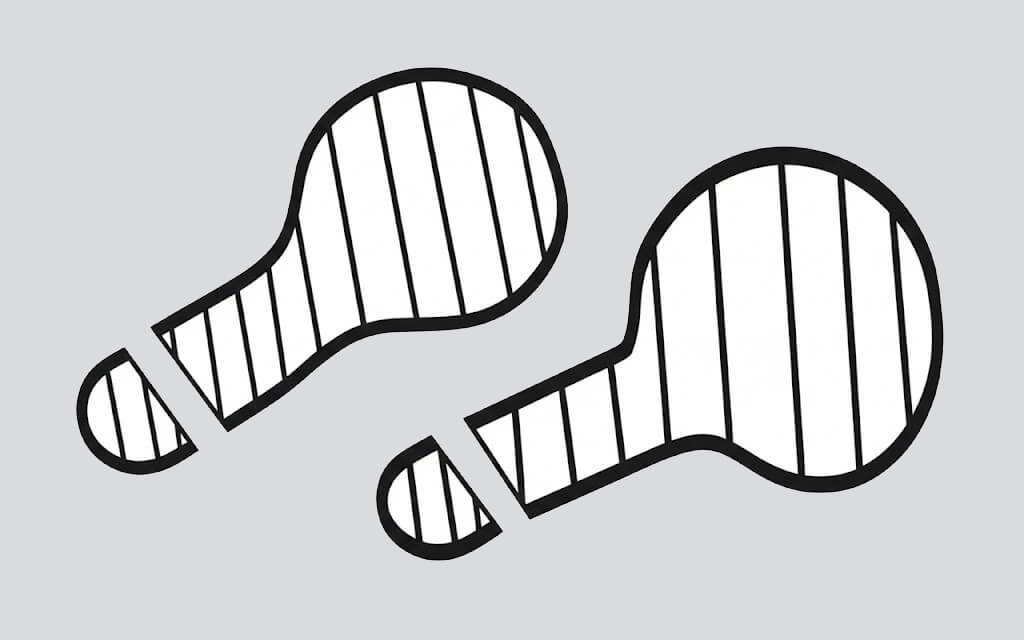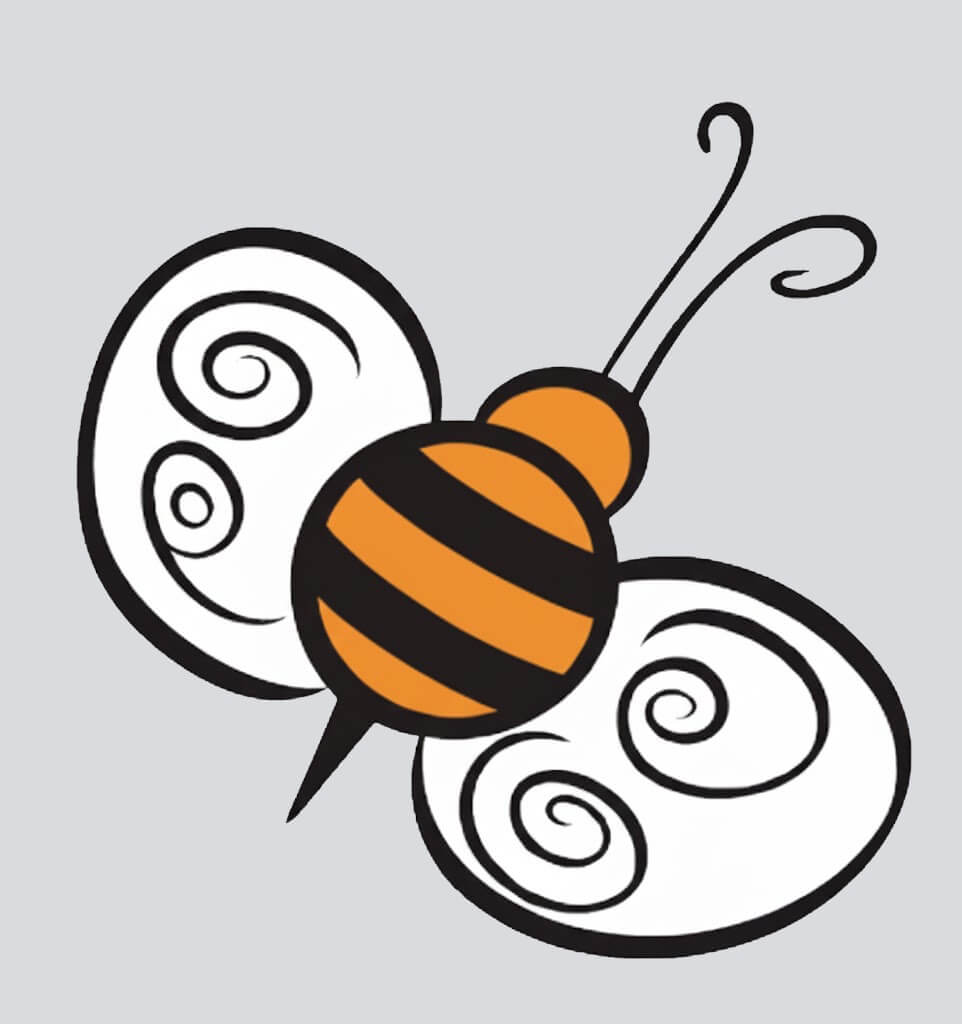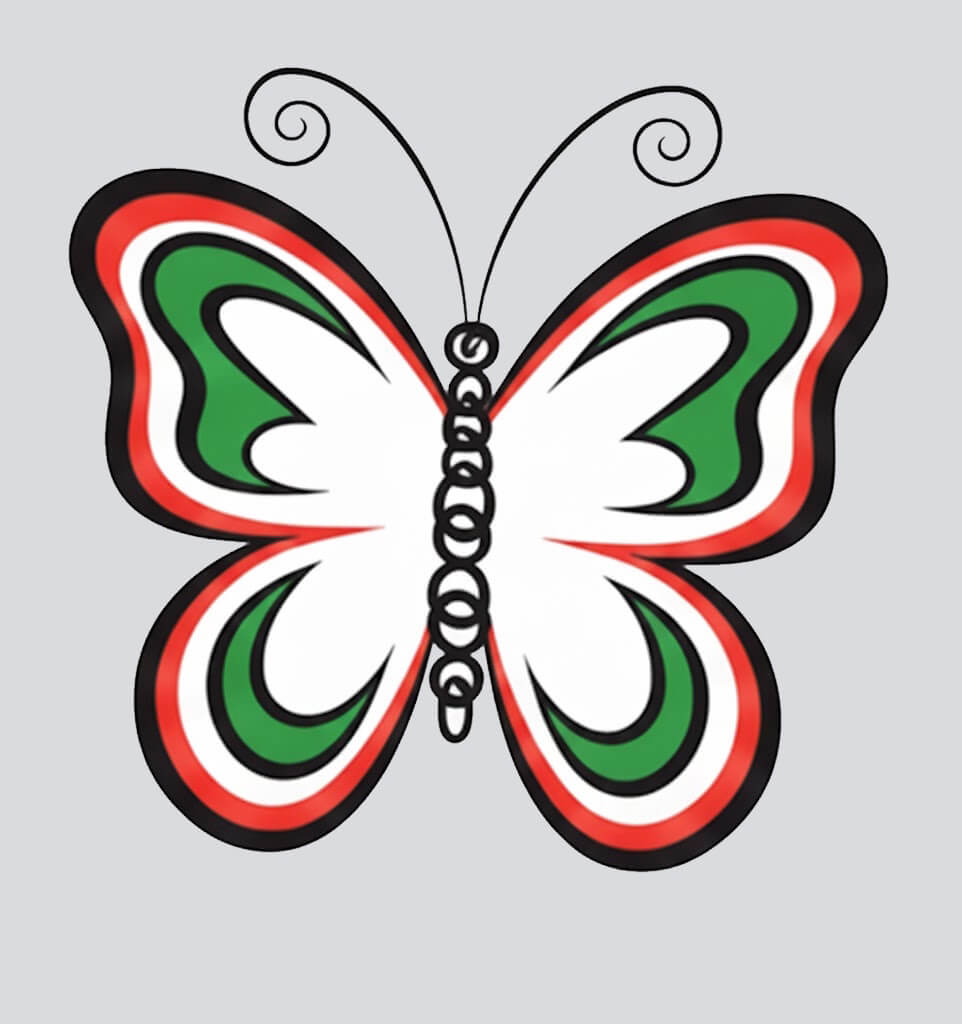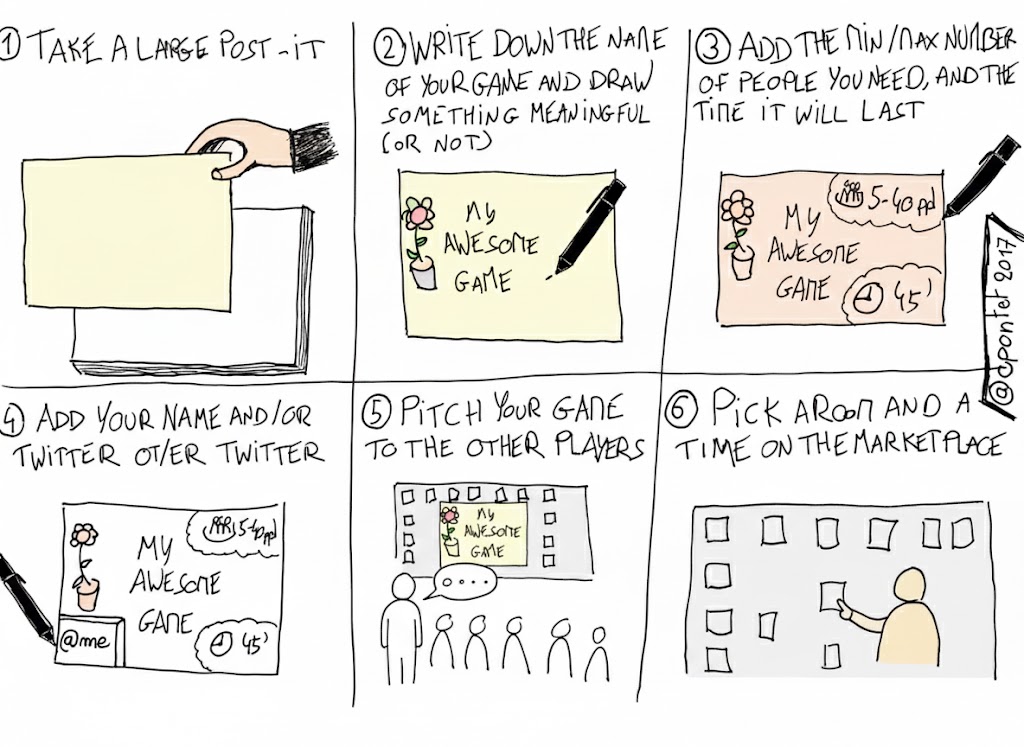Our format
What is an unconference?
#play14 is organized as an unconference, a conference format that follows the Open Space Technology
In this format, attendees are also session contributors. Anyone who wants to initiate a topic can claim a time slot in the agenda, and the schedule is done every morning, on the spot, as we will explain later.
Once you are there, the organizers' job is over. They have provided a location, food, and drinks for the rest of the event, then it's up to you as a participant to make it a great event.
Check out the funny drawings of Claudio Perrone
Principles
There are some simple rules for participants.
- Whoever comes is the right people
As a facilitator, you should welcome anyone who has decided to join your session, and not be frustrated if you expected different people.
As a participant, you should be ready to collaborate with anyone.
- Whenever it starts is the right time
As a facilitator, if you need some time to prepare, take it. Just think that people might get bored and go join another session. The best is to prepare anything in advance.
As a participant, there is nothing wrong with joining a session in progress. But respect the people who have already started, and try to jump in quietly.
- Wherever it is, is the right place
You will be offered several spaces for your session. Choose the one that fits your needs as a facilitator or as a participant.
- Whatever happens, is the only thing that could have
Be prepared to be surprised. Don't be annoyed if you get feedback. Don't be disappointed if it doesn't work. Try again if need be.
- When it's over, it's over
As a facilitator, it's up to you to mind your timebox. The organizers will not do it for you. Keep in mind that the participants of your session might want to go to another session after yours and that the room might be reserved after. Feel free to continue in a different location with whoever is interested.

The Law of Two Feet
Any time a person feels a session is not contributing to their learning, they have the responsibility to themselves to get up and move. That is, use their two feet or four wheels to move to a more interesting place. Neither the facilitator nor the other participants should feel offended about that. It's just what it is.

Bumblebee and Butterfly

A butterfly sits around looking relaxed and interesting discussions may emerge around them as people find them and pause to chat.
A bumblebee flies from one group to the other and cross-pollinating the discussions.

How does the schedule come up?
#play14 being an unconference, it's up to the participants to come up with the schedule. This is done every morning after some warm-up games when we fill up the marketplace.

The marketplace is a large board where you find vertically the list of all the spaces/rooms available, and horizontally all the time slots during the day. The participants come up with the schedule by adding their game/activity to the board.
How do I propose a game?
If you feel like proposing a game, you will have to pitch it in front of everyone, and then add it to the marketplace.
In order to do that, you need to:
- Take a large sticky note
- Write down the name of your game/activity. You can also draw something.
- Add the minimum and maximum number of people you need, and the time the game will approximately last.
- Add your name so we know who the sticky belongs to
- Enter the queue and pitch your game to the audience
- Pick a time slot and room on the marketplace and stick your sticky note

You do not need to go into many details. Just explain the main concept of your game, and list some of the takeaways. The goal is to give enough information so that people want to come to your session.
To keep it fun, make sure to keep it short.
What if the game I propose is not new?
It is perfectly fine to propose that has already been proposed by someone else or played before. Actually, it is encouraged, if you want to get better at facilitating. Over the years, some games have become the #play14 classics. Facilitating one of these is a great way to progress.
Remember that #play14 is about experimenting. It is by taking some risks and getting out of your comfort zone that you will get better. We have seen people who discovered a game one day as a player and facilitated that same game the next day.
Should I plan on debriefing my game?
YES, YES, and again YES. There is nothing sadder than a great game, full of learning opportunities, without a good debrief. Always keep some time to debrief your game/activity at the end of your session. It's your responsibility as a facilitator to make sure that all the participants can learn as much as possible from your game.
Remember that debriefing is about asking questions, not explaining to people what they should feel or understand. Try not to project your own understanding of the game, but instead ask powerful questions that will lead the group to insights linked to their own experience.
A great tool to help you do that is The Debriefing Cube.
What if I don't have any game/activity to propose?
- It's perfectly fine to attend #play14 without proposing any game/activity.
- Just make sure you get the most out of your days by participating the the games/activities you are most interested in
- Use the law of two feet if you don’t get enough value out of the session or think you can make yourself useful elsewhere
- Next time you attend, maybe you will have some game/activity to share
What kind of material will be available?
Common workshop materials and stationery will be available.
- Sticky notes
- Markers
- Whiteboard
- Flipchart
- Masking tape
- Paper
- Scissors
- Playing cards
- Dice
- LEGO bricks
- ...
If your game requires specific material, make sure you bring it with you or ask the hosting team in advance. If you cannot find what you are looking for, feel free to improvise.
What else do I need to know?
Here is what you need to know when attending a #play14 event.
Photography
We usually try to take a lot of pictures and videos during the event. We usually publish them on Twitter, Google Photo, Youtube, and our website.By participating to a #play14 event you tacitly agree to appear in any photo or video. However, if you find any one of them inconvenient or degrading, feel free to ask us, and we will remove the photo or video when possible.
Non profit
#play14 is completely non-profit. We ask you for money to pay for your food, drinks, welcome kit and game material during the event.Any profit that is made on a given event is automatically reinvested in the next event.
Schedule
#play14 usually takes course over two and a half days. It starts at 6 P.M. on the first day with some ice breakers and warm up games, and then a nice get-to-know-each-other dinner.On the second day, we start at 9 A.M. with the marketplace. Then, the sessions start. Lunch is usually served around 1 P.M. and a short debrief will take place at the end of the day, around 6 P.M.. Then it's pizza & beer time.
On the third day, the rhythm is almost the same except that we finish a little bit earlier because some people need to catch a flight and get back home.
Sessions
Gather with like-minded people on the unconference format. This means no slideshows, no rockstar sessions in push mode, but collaborative sessions where people get the opportunity to learn and practice but also discuss and challenge.So, bring the materials you need to organize and facilitate the learning activities you already know in order to share them actively with your peers in a learning-by-doing and collaborative mindset.
English will be used in all general communications, but we would like to let the session leaders decide which language to use in their session.
Unconference
An unconference is a conference format where attendees are also session contributors.
There are some simple rules for participants. They will be explained during the first evening plenary welcome speech, but usually, participants create the schedule during a marketplace session taking place at the beginning of each day.
Anyone who wants to initiate a topic can claim a time slot in the agenda.
Safety
One of the main objectives of #play14 is to provide a safe place for people to experiment. That means the event is designed to allow you to get as much fun as possible while learning and sharing. Therefore, the #play14 hosting teams try to encourage psychological safety and well as physical safety as much as possible.